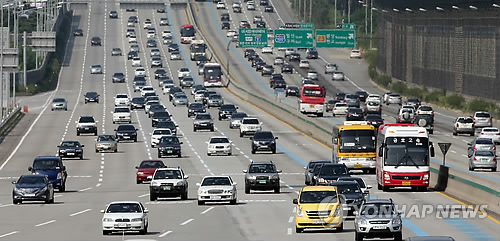Although diesel cars have retained the sales crown in Korean auto market over the past few years, signs of a slowdown are starting to show with consumers looking at wider options following a series of emissions scandals and the government’s push to regulate toxic nitrogen oxide emitted by diesel engines.
Until last year, diesel-powered cars accounted for more than 50 percent of the local auto market after growing fast from 30 percent in 2010 thanks to its high fuel-efficiency and government backing -- the cars were designated as eco-friendly vehicles in 2010.

However, the trend appears to be slowing down with consumers no longer viewing diesel cars as environment-friendly after Volkswagen’s emissions-cheating scandal. They are now rather blamed as the main culprit for emitting toxic nitrogen oxide, which leads to pulmonary diseases.
This year, from January to April, sales of Hyundai Motor and Kia Motors’ diesel-powered sedans saw a 28 percent drop on-year. Sales of the imported diesel cars, which have long led the diesel car market here, also saw a 6 percent drop, according to industry data.
Market watchers said the trend is expected to continue further with another diesel car, Qashqai from Nissan, recently being accused of cheating on emission tests.
“It will be difficult for the diesel car market to grow as fast as it did with consumers looking at wider options after a series of scandals and the government showing strong willingness to regulate gas-guzzling cars,” Lee Hang-koo, an analyst from the Korea Institute for Industrial Economics & Trade, told The Korea Herald by phone.
Amid the growing calls for regulating auto emissions, the government recently investigated 20 diesel cars made locally and globally to figure out their emission levels of nitrogen oxide.
Among the 20 diesel cars, the Ministry of Environment said 19 cars exceeded the standard except for BMW 520d. Nissan’s Qashqai and Renault Samsung’s cars exceeded the level 20 times and 17 times, respectively.
The ministry said it plans to strengthen the regulation on car emissions in September of 2017 when the European Union will adopt the same policy.
Experts said the market share lost by diesel cars is being replaced by eco-friendly cars such as hybrid and electric vehicles.
“The Korean auto market is seeing a fast growth of hybrid and electric vehicles aided by the popularity of Tesla’s electric cars and Toyota’s Prius,” said Kim Dae-won, a professor of Chonnam National University’s automobile department.
“Although it can’t fast replace the dominant position of diesel cars, green vehicles have much room to grow in the future.”
Sales of hybrid cars here rose more than 40 percent to 17,000 units from January to April on-year. Also, the combined sales of electric cars and fuel-cell vehicles rose 40 percent to 18,000 units during the same period, according to industry data.
By Shin Ji-hye (shinjh@heraldcorp.com)
Until last year, diesel-powered cars accounted for more than 50 percent of the local auto market after growing fast from 30 percent in 2010 thanks to its high fuel-efficiency and government backing -- the cars were designated as eco-friendly vehicles in 2010.

However, the trend appears to be slowing down with consumers no longer viewing diesel cars as environment-friendly after Volkswagen’s emissions-cheating scandal. They are now rather blamed as the main culprit for emitting toxic nitrogen oxide, which leads to pulmonary diseases.
This year, from January to April, sales of Hyundai Motor and Kia Motors’ diesel-powered sedans saw a 28 percent drop on-year. Sales of the imported diesel cars, which have long led the diesel car market here, also saw a 6 percent drop, according to industry data.
Market watchers said the trend is expected to continue further with another diesel car, Qashqai from Nissan, recently being accused of cheating on emission tests.
“It will be difficult for the diesel car market to grow as fast as it did with consumers looking at wider options after a series of scandals and the government showing strong willingness to regulate gas-guzzling cars,” Lee Hang-koo, an analyst from the Korea Institute for Industrial Economics & Trade, told The Korea Herald by phone.
Amid the growing calls for regulating auto emissions, the government recently investigated 20 diesel cars made locally and globally to figure out their emission levels of nitrogen oxide.
Among the 20 diesel cars, the Ministry of Environment said 19 cars exceeded the standard except for BMW 520d. Nissan’s Qashqai and Renault Samsung’s cars exceeded the level 20 times and 17 times, respectively.
The ministry said it plans to strengthen the regulation on car emissions in September of 2017 when the European Union will adopt the same policy.
Experts said the market share lost by diesel cars is being replaced by eco-friendly cars such as hybrid and electric vehicles.
“The Korean auto market is seeing a fast growth of hybrid and electric vehicles aided by the popularity of Tesla’s electric cars and Toyota’s Prius,” said Kim Dae-won, a professor of Chonnam National University’s automobile department.
“Although it can’t fast replace the dominant position of diesel cars, green vehicles have much room to grow in the future.”
Sales of hybrid cars here rose more than 40 percent to 17,000 units from January to April on-year. Also, the combined sales of electric cars and fuel-cell vehicles rose 40 percent to 18,000 units during the same period, according to industry data.
By Shin Ji-hye (shinjh@heraldcorp.com)








![[KH Explains] How should Korea adjust its trade defenses against Chinese EVs?](http://res.heraldm.com/phpwas/restmb_idxmake.php?idx=644&simg=/content/image/2024/04/15/20240415050562_0.jpg&u=20240415144419)











![[Today’s K-pop] Stray Kids to return soon: report](http://res.heraldm.com/phpwas/restmb_idxmake.php?idx=642&simg=/content/image/2024/04/16/20240416050713_0.jpg&u=)